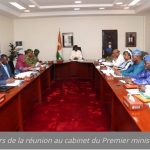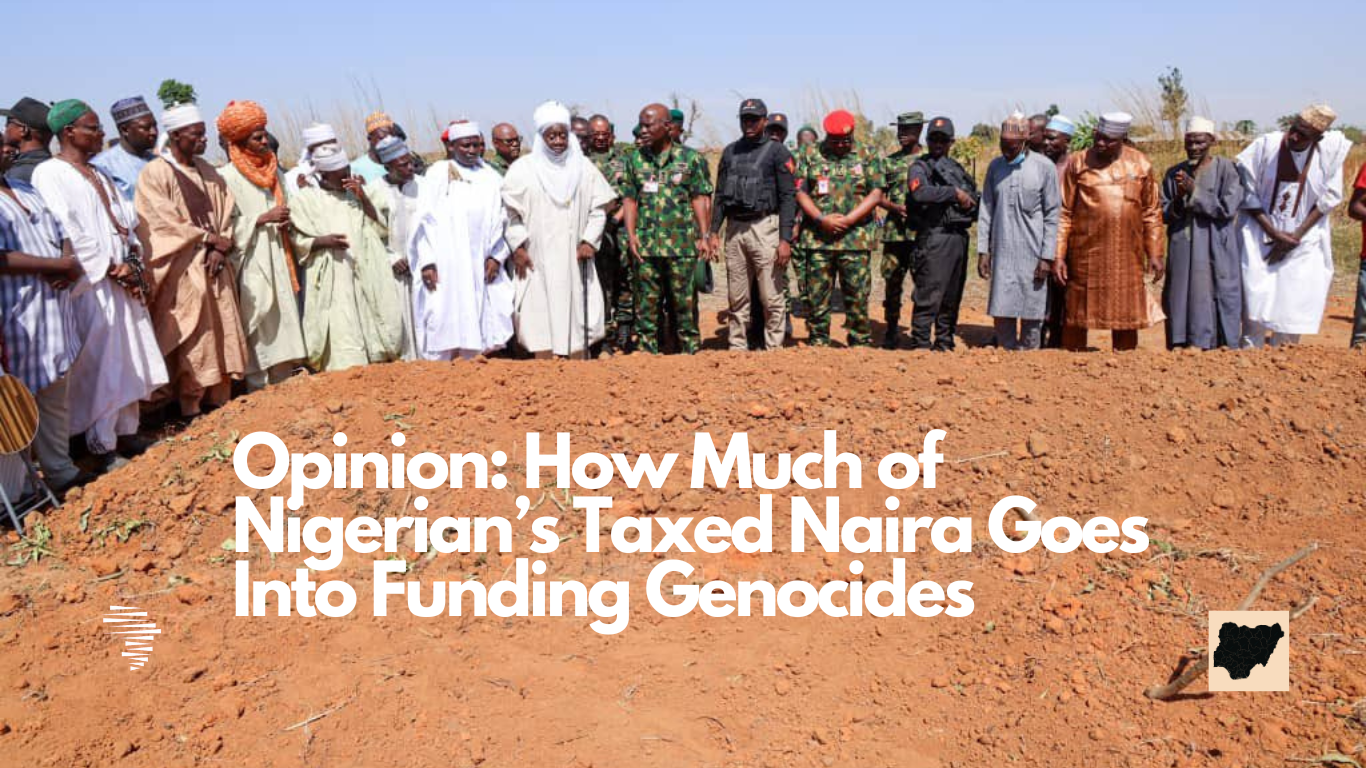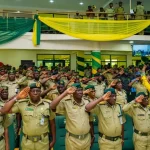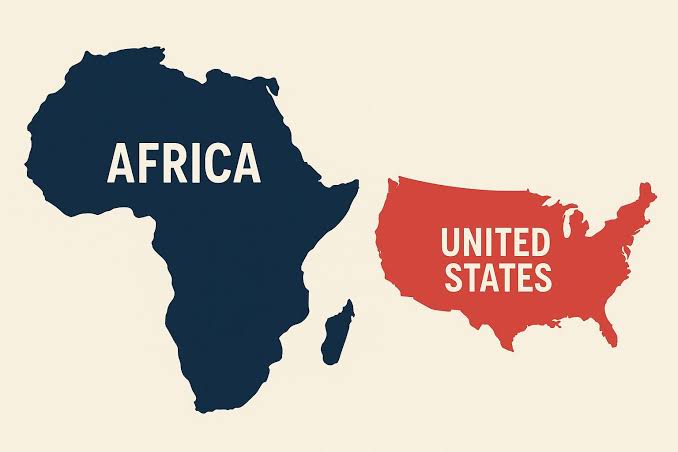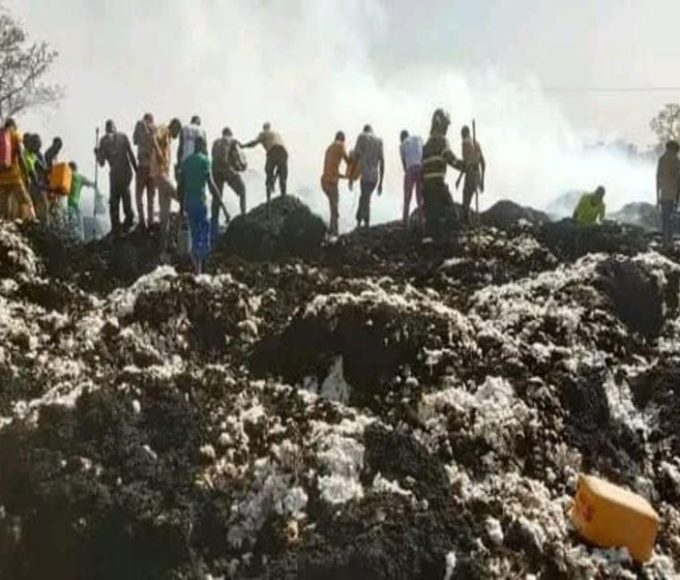
It is not new how much proportion of taxpayers’ money goes into funding the military through the Defense Ministry. This is not a surprise since the military is set up to protect the nation and its people.
However, the people whose commonwealth funds the military are not reliably informed about the specifics of the percentage that goes into defence spending. That being said, this opinion piece aims to address and detail how much-taxed naira goes into military activities and what it is spent on.
As a matter of fact, 12% of the N27.9 trillion 2024 fiscal budget is proposed to be spent on defence and security, which is understandable, knowing that no nation can survive its territorial grounds in the event of insecurities not funded to be put to rest. However, where public concerns need to be raised is when the Nigerian Military is tasked with protecting the nation and its people, and money is spent on drones to conduct genocides on the people the military is meant to protect and serve.
Let’s go back to a year in time. Former President Muhammadu Buhari spent 13.4% (N1 Trillion) of the 2023 budget of N20.5 trillion. According to reports from the Budget Office of the Federation, in the last fiscal year, 2023, the Federal Republic of Nigeria spent N1.79 trillion on national defence, which equates to 13.4 percent of the federal budget. This indicates that national defence is a priority. Speaking of priority, citizens need to ask at whose expense and for whom? Who benefits the most?
Former President Muhammadu Buhari’s military defence spending said to procure in US dollars a billion for purchase of military equipment with 12 A-29 Super Tucano fighter jets, 10 Super Mushshak fighter planes, five Mi-35M attack helicopters, four Augusta 109 helicopters, three J-F 17 Thunder jets, two Bell 412 helicopters, and two MI 171-E helicopters attributed to the Nigerian Air Force while the Nigerian Navy also procured 200 Riverine Patrol Boats and 114 Rigid Hall Inflatable Boats (RHIBs).
It also procured 22 fast attack boats, 14 Unmanned Aerial Vehicles otherwise known as drones, 14 houseboats, 14 River Town Boats, 12 Manta Class/Inshore Patrol Craft (IPC), three Whaler Boats, four helicopters, and four Barges/Tugboats. Others include 14 House Boats, two Seaward Defence Boats (SDB), and four Capital Ships.
In line with the president’s directive, the Nigerian Navy has established a naval base in Lake Chad, Baga, Borno State. It also received Buhari’s approval for new naval bases in Lekki, Lagos State, Oguta, Imo State, and Kano, Kano State. It is worth noting that much of these proposed bases went with the last administration, which brought us to the 2024 fiscal budget with a provision of N3.25 trillion proposed for defence spending. While this is commendable as far as security and defence are concerned, the public needs to question cases of irregularities in carrying out military operations in civilian territories where insecurities have been perpetrated and the most dangerous threats to safety and security. So also on the need to end soldier’s laments on obsolete equipment.
Viewpoints
Any military parastatal tasked with public safety and security measures yet poses a danger to the people it is meant to protect and serve should be put to a committee of accountability for not doing their job. Why? The recent event put over 100 civilians in Kaduna to their early graves due to what the military called “Mistakes”. Bombing civilians in a drone strike not only shows how unprofessional the Nigerian Armed Forces is but also subtly informs the people the government of the day is failing at protecting its people, and their safety is never guaranteed. But what will a 12% budget do differently in the 2024 fiscal proposed budget, unlike the past that has provided its people with the bombing of over 100 civilians in Borno in 2017 or the December 2017 bombing in Adamawa resulting in the loss of over 80 civilians?
A mistake repeated once is considered a human error. Twice is a pattern. Third is a repeated pattern of decisions that the military gets away with as the survivors silence allows it. But in the space of 2017 and now, “mistakes” of the reported bombing of civilians by the Nigerian Army and Airforce is a decision that has been allowed too many times without accountability or any sprout growth of conscience and concern for human rights law in cases of war crimes.
Conclusion
No citizen should fund its genocide if and when the military fails. Going forward, professionalism must be the severance package of safety gifts wrapped in an unwavering support system to protect lives and properties. Signing the budget shouldn’t be a thing of politics and profiteers of war crimes but of public service. Lastly, in the awakening of more active citizens and functioning human rights and civil society organizations, accountability and justice will slowly but essentially be the bedrock of building our national security and safety. Mistakes repeated more than once by the military service a decision that the citizens must kick against if we are to survive internally as a nation that commands respect and authority in Africa.
About The Author
Mayowa Durosinmi
author
M. Durosinmi is a West Africa Weekly investigative reporter covering Politics, Human Rights, Health, and Security in West Africa and the Sahel Region
Mayowa Durosinmi
M. Durosinmi is a West Africa Weekly investigative reporter covering Politics, Human Rights, Health, and Security in West Africa and the Sahel Region
Related Articles
Sovereignty for Sale? African Leaders Under Fire for “Lopsided” US Health Deals Linked to CIA Mind Control Research
A diplomatic firestorm is sweeping across Africa after 17 nations signed on...
ByWest Africa WeeklyFebruary 27, 2026Zimbabwe Rejects $350m US Health Deal Over Sovereignty Dispute
Zimbabwe has formally withdrawn from negotiations on a proposed $350 million health...
ByWest Africa WeeklyFebruary 25, 2026Niger’s President Outlines Vision for Strategic Partnership with China
Niger’s Head of State, General Abdourahmane Tiani, has articulated a renewed vision...
ByWest Africa WeeklyFebruary 25, 2026Fire Destroys 140 Tonnes of Cotton in Western Burkina Faso
A major fire has destroyed more than 140 tonnes of cotton in...
ByWest Africa WeeklyFebruary 25, 2026


